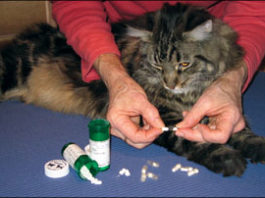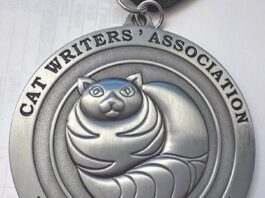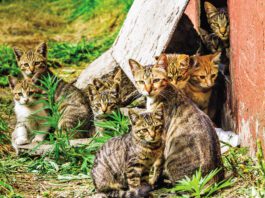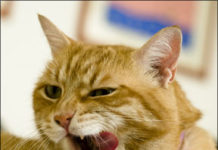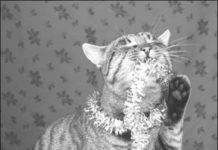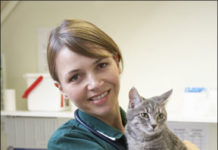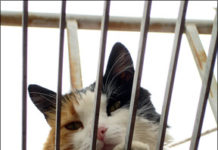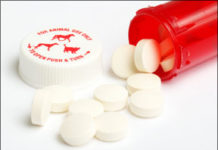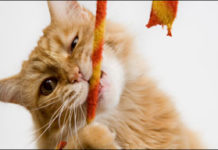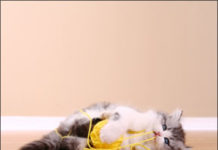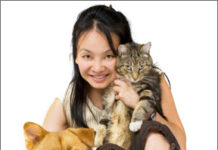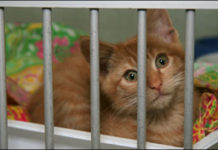Short Takes: December 2010
Researchers developed a questionnaire for evaluation of cat owners perception of and knowledge about vaccination of cats, with owners asked to fill out a separate questionnaire for each cat they owned. A total of 3,163 questionnaires were evaluated ("Use of a web-based questionnaire to explore cat owners attitudes towards vaccination in cats," Veterinary Record, 2010). Vaccination as a kitten was the strongest predictor of up-to-date vaccination status, followed closely by plans to take the cat to a boarding cattery or cat show in the coming year. Owners who ranked the severity of infectious diseases or veterinary advice as very important were more likely to vaccinate their cats than owners who perceived these factors as less important.
Short Takes: November 2010
There is a growing understanding of osteoarthritis (OA) - also called degenerative joint disease - in cats that has led to investigation of the clinical signs, radiographic findings and also treatments. Cats are very good at compensating for orthopedic diseases, and therefore the clinical signs of arthritis are more difficult to detect and are different than those seen in dogs.
Short Takes: October 2010
Feline leukemia (FeLV) and feline immunodeficiency virus (FIV) are both serious pathogens of cats that often result in lifelong infection. Routine testing - as well as testing of clinically ill cats - is recommended, and is usually performed by using in-clinic test kits. For FeLV, these assays detect a viral protein, whereas a virus-specific antibody is detected for FIV. A new test system, Anigen Rapid FIV Ab/FeLV Ag test kit is now available on the European market. These investigators examined the diagnostic sensitivity and specificity of this new test kit on 300 samples using western blot as the gold standard for FIV infection, and polymerase chain reaction for FeLV infection; in addition, results were compared to those attained using the most commonly-used kit made by IDEXX (SNAP Combo).
Curing Ringworm in a Shelter
Ringworm (dermatophytosis) is a superficial - yet highly contagious - fungal skin infection that affects many animals, as well as humans. In healthy cats, it is generally self-curing, and should resolve over the course of several months. However, treatment will shorten the course and help to prevent it from spreading, including to humans. This is particularly important in a shelter environment where infection can negatively impact adoptions, and is a risk for staff and visitors.
Short Takes: August 2010
Diabetes mellitus (DM) is a common endocrine disease in cats, and it is becoming a model for DM in humans because cats develop a form of the disease that is similar to the human type-2 diabetes mellitus. Amylin is a normal secretory product of pancreatic beta cells, and it plays an important role in controlling nutrient fluctuations. Amylin has become an established therapy along with insulin in human diabetics because it reduces post-prandial glucagon secretion and slows gastric emptying. This study ("Amylin reduces plasma glucagon concentration in cats," The Veterinary Journal, 2010) was the first to investigate if amylin reduces plasma glucagon levels in cats.
Short Takes: June 2010
Pet owners may not realize that retention of the tablets or capsules of certain drugs (e.g., doxycycline and clindamycin) in the esophagus of the cat can cause inflammation and stricture formation. Experts currently recommend that cats should never be given medication "dry" - instead, any pill or capsule should be followed with a food treat or a bolus of water. This study ("A comparative study evaluating the esophageal transit time of eight healthy cats when pilled with the FlavoRx pill glide versus pill delivery treats" in the Journal of Feline Medicine & Surgery, 2010) was designed to evaluate the esophageal transit time of tablets and capsules when administered with either the FlavoRx pill glide or Greenies Pill Pockets.
Short Takes: May 2010
A questionnaire-based tool was used in this study ("A Study of Owner Observed Behavioral and Lifestyle Changes in Cats with Musculoskeletal Disease Before and After Analgesic Therapy" in the Journal of Feline Medicine and Surgery, 2009) to identify behavioral and lifestyle changes that are associated with chronic pain in cats. The changes were grouped into four behavior categories (mobility, activity, grooming and temperament).
Short Takes: April 2010
Ingestion of foreign bodies - including string-like objects - is a common problem seen in feline veterinary medicine. Foreign bodies may cause partial or complete gastrointestinal (GI) obstruction, which results in disturbances of fluid and electrolyte balance as well as dehydration. Damage to the intestinal tract can also occur. This study ("Gastrointestinal foreign bodies in dogs and cats: a retrospective study of 208 cases" in the Journal of Small Animal Practice, 2009) reviewed the records of 208 cases of GI foreign bodies in dogs and cats that were brought in to the RSPCA Greater Manchester Animal Hospital in the UK from June 2003 to May 2007.
Short Takes: March 2010
Primary septic peritonitis is an abdominal infection without a primary focus, such as a perforated bowel. The most common cause in cats is feline infectious peritonitis (FIP). Unfortunately, little is known about primary bacterial septic peritonitis in cats. The investigators (" Primary bacterial septic peritonitis in cats" in the Journal of the American Animal Hospital Association, Nov-Dec 2009) examined the medical records of twelve cats diagnosed with primary bacterial septic peritonitis and identified significant characteristics associated with this condition.
Short Takes: December 2009
Pet Style News has awarded Soft-Hearted Products their "Editors Choice Award" for best pet memorial product. Every year, Pet Style News magazine searches for the most innovative new pet products. According to Pet Style News, the Soft-Hearted Pillow is "a major departure from the wood, ceramic and stone urns available on the market. This product gives the mourning pet owner a way to continue to hold and hug the lost pet in the form of a velvet-soft pillow with the pets ashes safely contained inside a zippered pouch at the center."
Short Takes: January 2010
A common disease in cats, upper respiratory tract disease (URTD) can spread quickly among cats residing in animal shelters. These infections cause discomfort in the animals, consume vital personnel and financial resources and limit adoptions. In a large urban shelter in the northeast United States, 531 kittens, 701 litters and 2,203 adult cats were observed during their stays on a daily basis over a period of 50 weeks for signs of URTD ("Descriptive epidemiology of feline upper respiratory tract disease in an animal shelter" in the Journal of Feline Medicine and Surgery, 2009).
Short Takes: February 2010
Some involved with animal welfare are critical of free adoptions of adult cats, believing it devalues the cat in the adopters eyes, or it may attract adopters who are unable to fulfill the financial responsibilities of cat ownership. Advocates believe waiving the fee for adult cats will enhance rates of adoptions, and provide opportunities to educate owners who may otherwise adopt from neighbors or may respond to "free to good home" ads.


